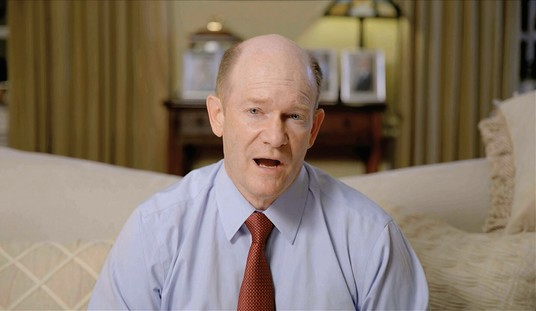The United States is not only exporting “molecules of freedom” to our allies; we’re also exporting smart nuclear energy technologies, too.
This week, our Department of Energy (DOE) signed a blockbuster nuclear energy deal with Lithuania - the Baltic nation my family hails from. Outgoing Energy Secretary Jennifer Granholm and Lithuanian Energy Minister Dainius Kreivys unveiled an inaugural Intergovernmental Agreement involving fourth-generation small modular reactors (SMRs) during bilateral meetings held on November 26th, 2024. The official press release claims the deal will boost “the U.S. civil nuclear industry, U.S. technological leadership and U.S. competitiveness while advancing the highest standards of safety and security.”
“Energy was instrumental in regaining our independence,” Lithuanian Vice Energy Minister Albinas Zananavičius exclusively told Townhall.com in an interview. “For those in the West who still have some illusions that one can run business with Russia, we always saw it differently because Russia started pressing us in the energy field in the very beginning of our independence.”
This, however, is not Lithuania’s first rodeo with nuclear power. The Baltic country produced 70% of its electricity from two reactors located at Ignalina Nuclear Power Plant until 2009, when European Union (EU) pressure forced the plant’s permanent closure. A month after Unit 2’s closure, in January 2010, electricity prices reportedly soared 33%. As a result, it went from a net-exporter to net-importer of electricity and, ironically, being reliant on Russia again. Attempts to construct new nuclear power plants, including a failed deal with GE Hitachi, didn’t materialize. But Lithuania’s vice energy minister is hopeful SMRs will break through.
Zananavičius said shutting down Ignalina NPP “was really painful” because his country was “losing [a] lion's share of its generation overnight.” But the vice minister said by 2028-2029, the country would achieve 100% self-sufficiency from sources like wind, solar, hydropower, and gas until nuclear energy is added into the mix.
Recommended
“The agreement with the United States government that we have signed [on November 26th, 2024] allows us to get more technical cooperation and get ready for deployment of those small modular reactors,” he explained. “We will be receiving assistance in selecting what type of technology is optimal for us, so I think this will be win-win cooperation because we are not newcomers in the nuclear world. Once we decide to proceed, I think we can move very, very fast, because we already have a site for the new nuclear installation.That site has all the necessary infrastructure.”
Vice Minister Zananavičius says new nuclear installations could go online “sometime around 2035” and will give Lithuanians an upper hand with “access to American technology” and “American knowledge.”
“It was important to put Lithuania on the map for countries that will be developing nuclear generation,” he continued.
There are three main nuclear reactors: conventional reactors, small modular reactors (SMRs), and microreactors. With over 80 SMR prototypes, SMRs are being sought-after here in the U.S. Why? SMRs are advanced nuclear reactors with a capacity of 300 megawatts (MW) per unit - producing a third of the electricity of conventional reactors. However, these smaller units are greatly sought after today because they’re affordable, portable, and can be built at difficult locations. These reactors have another added benefit: they can be refueled every 3-7 years, compared to 1-2 years demanded by conventional reactors. It’s no wonder Amazon, Microsoft, Google, and similar technology companies are banking big on SMRs.
Like the U.S., this underappreciated NATO ally– like the rest of Europe – is finally getting serious about nuclear energy. Many countries are interested in nuclear power because it’s a reliable baseload power that is safe, operates nearly 24/7, and is reliable. The EU currently boasts 103 nuclear reactors across 13 member states–supplying 25% of the EU’s net electricity generation. As countries like Lithuania look to nuclear, Germany and Spain, sadly, are heading down the wrong path with nuclear phaseouts.
Lithuania was the first of 15 occupied nations to break from the former Soviet Union. Now it’ll become the first European nation to decouple from Russia’s electric grid by February 8, 2025. On Halloween the capital city, Vilnius, unveiled a 100-day countdown to mark its synchronization into Europe’s electric grid.
Following Russia’s illegal invasion of Ukraine in 2022, Lithuania declared its independence from Russian oil and gas. Ahead of our election, incoming National Security Advisor Mike Waltz told NPR that Lithuania bought “85% of their oil and gas from Texas and Louisiana.”
As I told Lithuanian National Radio and Television (LRT) this week, this SMR deal between our two nations will likely continue under incoming Trump Energy Secretary Chris Wright, Jennifer Granholm’s successor, when he assumes control of the department in January. Wright not only supports oil and gas, but is also a booster of reliable clean supplements like nuclear and geothermal.
As America leads on energy abundance, others will follow suit. Let’s hope Lithuania can deploy nuclear energy again under this new SMR deal.
























Join the conversation as a VIP Member